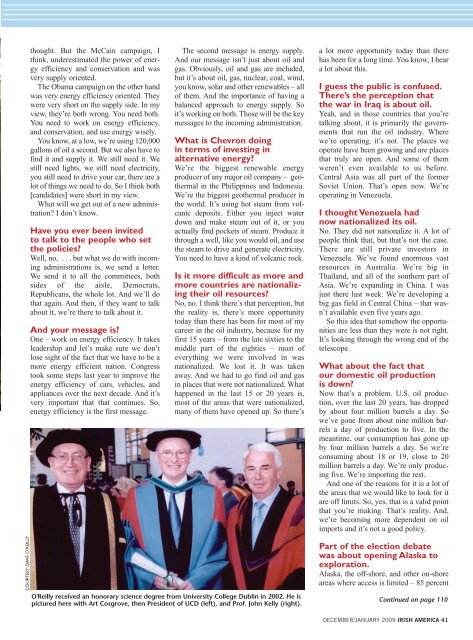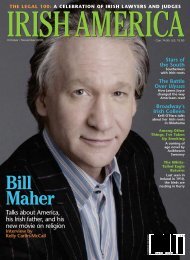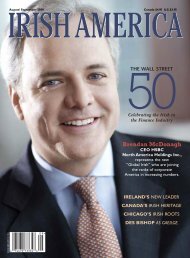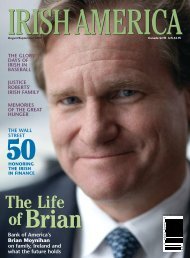You also want an ePaper? Increase the reach of your titles
YUMPU automatically turns print PDFs into web optimized ePapers that Google loves.
thought. But the McCain campaign, I<br />
think, underestimated the power of energy<br />
efficiency and conservation and was<br />
very supply oriented.<br />
The Obama campaign on the other hand<br />
was very energy efficiency oriented. They<br />
were very short on the supply side. In my<br />
view, they’re both wrong. You need both.<br />
You need to work on energy efficiency,<br />
and conservation, and use energy wisely.<br />
You know, at a low, we’re using 120,000<br />
gallons of oil a second. But we also have to<br />
find it and supply it. We still need it. We<br />
still need lights, we still need electricity,<br />
you still need to drive your car, there are a<br />
lot of things we need to do. So I think both<br />
[candidates] were short in my view.<br />
What will we get out of a new administration?<br />
I don’t know.<br />
Have you ever been invited<br />
to talk to the people who set<br />
the policies?<br />
Well, no, . . . but what we do with incoming<br />
administrations is, we send a letter.<br />
We send it to all the committees, both<br />
sides of the aisle, Democrats,<br />
Republicans, the whole lot. And we’ll do<br />
that again. And then, if they want to talk<br />
about it, we’re there to talk about it.<br />
And your message is?<br />
One – work on energy efficiency. It takes<br />
leadership and let’s make sure we don’t<br />
lose sight of the fact that we have to be a<br />
more energy efficient nation. Congress<br />
took some steps last year to improve the<br />
energy efficiency of cars, vehicles, and<br />
appliances over the next decade. And it’s<br />
very important that that continues. So,<br />
energy efficiency is the first message.<br />
The second message is energy supply.<br />
And our message isn’t just about oil and<br />
gas. Obviously, oil and gas are included,<br />
but it’s about oil, gas, nuclear, coal, wind,<br />
you know, solar and other renewables – all<br />
of them. And the importance of having a<br />
balanced approach to energy supply. So<br />
it’s working on both. Those will be the key<br />
messages to the incoming administration.<br />
What is Chevron doing<br />
in terms of investing in<br />
alternative energy?<br />
We’re the biggest renewable energy<br />
producer of any major oil company – geothermal<br />
in the Philippines and Indonesia.<br />
We’re the biggest geothermal producer in<br />
the world. It’s using hot steam from volcanic<br />
deposits. Either you inject water<br />
down and make steam out of it, or you<br />
actually find pockets of steam. Produce it<br />
through a well, like you would oil, and use<br />
the steam to drive and generate electricity.<br />
You need to have a kind of volcanic rock.<br />
Is it more difficult as more and<br />
more countries are nationalizing<br />
their oil resources?<br />
No, no. I think there’s that perception, but<br />
the reality is, there’s more opportunity<br />
today than there has been for most of my<br />
career in the oil industry, because for my<br />
first 15 years – from the late sixties to the<br />
middle part of the eighties – most of<br />
everything we were involved in was<br />
nationalized. We lost it. It was taken<br />
away. And we had to go find oil and gas<br />
in places that were not nationalized. What<br />
happened in the last 15 or 20 years is,<br />
most of the areas that were nationalized,<br />
many of them have opened up. So there’s<br />
a lot more opportunity today than there<br />
has been for a long time. You know, I hear<br />
a lot about this.<br />
I guess the public is confused.<br />
There’s the perception that<br />
the war in Iraq is about oil.<br />
Yeah, and in those countries that you’re<br />
talking about, it is primarily the governments<br />
that run the oil industry. Where<br />
we’re operating, it’s not. The places we<br />
operate have been growing and are places<br />
that truly are open. And some of them<br />
weren’t even available to us before.<br />
Central Asia was all part of the former<br />
Soviet Union. That’s open now. We’re<br />
operating in Venezuela.<br />
I thought Venezuela had<br />
now nationalized its oil.<br />
No. They did not nationalize it. A lot of<br />
people think that, but that’s not the case.<br />
There are still private investors in<br />
Venezuela. We’ve found enormous vast<br />
resources in Australia. We’re big in<br />
Thailand, and all of the southern part of<br />
Asia. We’re expanding in China. I was<br />
just there last week. We’re developing a<br />
big gas field in Central China – that wasn’t<br />
available even five years ago.<br />
So this idea that somehow the opportunities<br />
are less than they were is not right.<br />
It’s looking through the wrong end of the<br />
telescope.<br />
What about the fact that<br />
our domestic oil production<br />
is down?<br />
Now that’s a problem. U.S. oil production,<br />
over the last 20 years, has dropped<br />
by about four million barrels a day. So<br />
we’ve gone from about nine million barrels<br />
a day of production to five. In the<br />
meantime, our consumption has gone up<br />
by four million barrels a day. So we’re<br />
consuming about 18 or 19, close to 20<br />
million barrels a day. We’re only producing<br />
five. We’re importing the rest.<br />
And one of the reasons for it is a lot of<br />
the areas that we would like to look for it<br />
are off limits. So, yes, that is a valid point<br />
that you’re making. That’s reality. And,<br />
we’re becoming more dependent on oil<br />
imports and it’s not a good policy.<br />
COURTESY: DAVE O’REILLY<br />
O'Reilly received an honorary science degree from University College Dublin in 2002. He is<br />
pictured here with Art Cosgrove, then President of UCD (left), and Prof. John Kelly (right).<br />
Part of the election debate<br />
was about opening Alaska to<br />
exploration.<br />
Alaska, the off-shore, and other on-shore<br />
areas where access is limited – 85 percent<br />
Continued on page 110<br />
DECEMBER/JANUARY 2009 <strong>IRISH</strong> <strong>AMERICA</strong> 41









